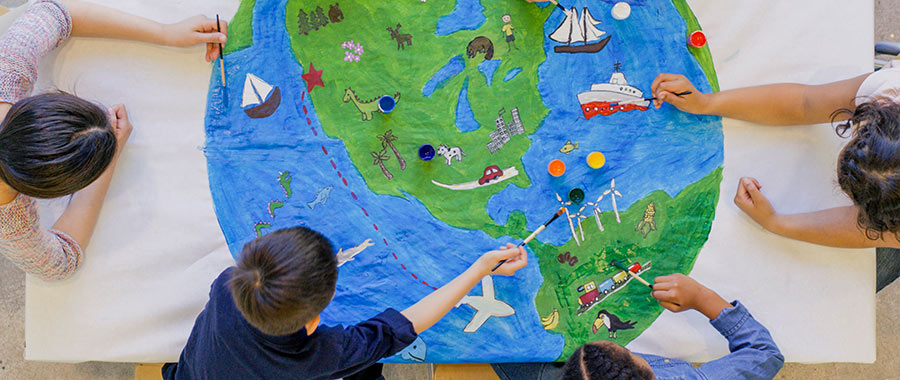In an era marked by discord, animosity, and abounding divisions, the concept of unity emerges as a resplendent beacon, illuminating the path toward collective harmony. The Bahá’í teachings elucidate this theme of unity as not merely an abstract notion, but as a profound and deeply rooted aspiration inherent in the human condition. To delve into this realm is to traverse the intricate tapestry of human relationships, to acknowledge our shared essence, and to endeavor toward an elevated consciousness that transcends superficial distinctions.
At the heart of Bahá’í philosophy lies the assertion that humanity constitutes a singular family, interwoven by shared experiences and a collective destiny. The metaphorical depiction of humanity as branches of a grand tree encapsulates this idea succinctly. Each branch, while distinct in its form and function, relies on the common root for sustenance. This imagery poignantly expresses the interconnectedness of our lives and the inescapable truth that progress or adversity faced by one affects the whole. Thus, unity transcends mere cooperation; it necessitates an ethos of mutual recognition and respect.
The quest for unity challenges individuals to overcome the vestiges of prejudice—be it racial, religious, or social. Prejudice functions as a formidable barrier, obscuring the innate bond that unites us all. When one is enveloped in prejudice, they view others through a distorted lens, perceiving differences instead of commonalities. The Bahá’í teachings advocate for the dismantling of these barriers, encouraging the cultivation of virtues such as empathy, compassion, and understanding. By consciously anchoring our interactions in these principles, we can foster authentic connections that honor the diverse yet unified nature of humanity.
The notion of unity extends beyond interpersonal relationships and is equally vital within the frameworks of societies and nations. The Bahá’í belief emphasizes global cooperation—a necessity born from the realization that the challenges confronting humanity, such as climate change, economic disparity, and geopolitical conflicts, are inherently global in nature. In this regard, the world is analogous to a vast interdependent ecosystem, wherein the actions of one component reverberate across the entire system. Thus, the aspiration for unity serves as the cornerstone for fostering global consciousness, wherein nations engage in collaborative endeavors to address shared challenges.
Historically, unity has often been misconstrued as mere uniformity; however, the Bahá’í teachings elucidate that true unity is rather a harmonious synthesis of diversity. This nomenclature proposes that a multitude of perspectives enhances collective understanding and innovation. Each culture, religion, and ideology contributes a unique dimension to the shared tapestry of human experience. In this light, unity becomes a dynamic interplay—a symphony where varying notes converge to create a resonant, enriching experience. Recognizing the value of diverse contributions is crucial; this perspective cultivates an environment where creativity and cooperation can flourish.
Additionally, the teachings articulate that unity in diversity manifests not only in societal structures but also within individual spiritual development. The journey of understanding oneself and establishing connection with others is deeply intertwined with the profound realization of our shared human attributes. In this context, the metaphysical idea of the soul emerges as a pivotal focal point. The soul, in Bahá’í thought, is intrinsically linked to the Divine and reflects the potential for love, grace, and unity. Therefore, nurturing this spiritual essence in oneself is fundamental to extending it toward others, ultimately fostering a culture of oneness.
This intricate dance of personal and communal development necessitates education as a pivotal mechanism for advancing unity. The Bahá’í teachings stress education’s transformative power—it acts as a catalyst for fostering understanding, empathy, and social cohesion. By imparting knowledge that underlines our interdependence, education enables individuals to transcend ignorance and prejudicial sentiments. Furthermore, it encourages the cultivation of critical thinking, empowering individuals to engage with complex global issues in thoughtful ways. In essence, education serves as the beacon that lights the way toward a unified existence.
The journey toward unity, as articulated in the Bahá’í teachings, embodies a spiritual and moral pilgrimage, requiring steadfast commitment and earnest effort. It demands a willingness to embrace discomfort, to shatter preconceived notions, and to meticulously eradicate the ego that insists on division. This is not an easy endeavor; it calls for resolve, humility, and an unwavering faith in the possibility of transformation. In this pursuit, the path becomes evident: an incremental shift towards fostering an atmosphere of acceptance and cooperation can lead to substantial societal change.
Ultimately, the Bahá’í vision for unity is one that transcends the constraints of the present landscape, infused with hope and possibility. It envisions a world where the fruits of unity bear witness to the profound interconnectedness of humanity—where differences are celebrated and embraced as the very essence that enriches our shared experience. In pursuing this ideal, individuals and communities not only uplift themselves but illuminate the path for future generations, ensuring that the legacy of unity endures as a foundational goal within the human narrative.
In conclusion, the aspiration for unity outlined in the Bahá’í teachings acts as an archetype for human potential—a sublime ambition that, when fervently pursued, can yield profound change. By championing this cause, individuals contribute to the evolution of a more just, equitable, and harmonious world, thereby fulfilling the deepest and most profound desire that resides within us all.
